Related Research Articles
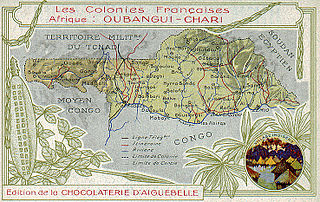
The history of the Central African Republic is roughly composed of four distinct periods. The earliest period of settlement began around 10,000 years ago when nomadic people first began to settle, farm and fish in the region. The next period began around 10,000 years prior.

François Bozizé Yangouvonda is a Central African politician who was President of the Central African Republic from 2003 to 2013.

The Central African Republic Bush War was a civil war in the Central African Republic which lasted from 2004 to 2007 between Union of Democratic Forces for Unity (UFDR) rebels and government forces. The rebellion began after François Bozizé seized the nation's presidency in 2003. Actual fighting began in 2004. Around 10,000 people were displaced because of the civil unrest.

Faustin-Archange Touadéra is a Central African politician and academic who has been President of the Central African Republic since March 2016. He previously was Prime Minister of the Central African Republic from January 2008 to January 2013. In the December 2015 – February 2016 presidential election, he was elected to the presidency in a second round of voting against former Prime Minister Anicet Georges Dologuélé. He was re-elected for a second term on 27 December 2020.
Jean-Jacques Démafouth is a political leader in the Central African Republic. He is a former Defense Minister, Presidential candidate, and is the current political leader of the APRD rebel group. He led the peace delegation of the APRD to talks with the government in December 2008.

Michel Am-Nondokro Djotodia is a Central African politician who was President of the Central African Republic from 2013 to 2014. He was the first Muslim to hold that office in the predominantly Christian country. Djotodia was a leader of the almost entirely Muslim Séléka rebel coalition in the December 2012 rebellion against President François Bozizé. Following a peace agreement, Djotodia was appointed to the government as First Deputy Prime Minister for National Defense in February 2013. When the peace agreement unravelled, Séléka captured Bangui and Djotodia took power on 24 March 2013. He promised to lead a transition to new elections in which he would not be a candidate, but his time in office was marked by escalating sectarian violence, and he was ultimately pressured into resigning by regional leaders on 10 January 2014.

The Central African Republic Civil War is an ongoing civil war in the Central African Republic (CAR) involving the government, rebels from the Séléka coalition, and Anti-balaka militias.

General elections were held in the Central African Republic on 30 December 2015 to elect the president and National Assembly. As no presidential candidate received more than 50% of the vote, and following the annulling of the results of the National Assembly elections by the Transitional Constitutional Court, a second round of the presidential elections and a re-run of the parliamentary elections were held on 14 February 2016, with second round run-offs for the parliamentary elections on 31 March.

Séléka CPSK-CPJP-UFDR was an alliance of rebel militia groups that subjugated the Central African Republic (CAR) on 24 March 2013. After its official dissolution in September 2013, the remaining rebel groups became known as Ex-Séléka. Séléka leader Michel Djotodia became the nation's president from March 2013 until his resignation in January 2014. Members of Séléka were almost all Muslim.
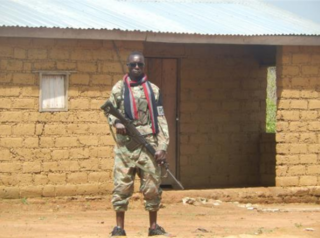
The Democratic Front of the Central African People is an anti-government militia in the Central African Republic. It is one of the major combatants in the Central African Republic Bush War and a member of the Séléka CPSK-CPJP-UFDR group that overthrew the national government in March 2013.
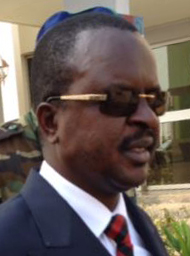
Alexandre-Ferdinand Nguendet is a Central African politician who served as President of the National Transitional Council of the Central African Republic from 2013 to 2016. He briefly served as Acting President of the Central African Republic in January 2014.

An internal conflict in the Central African Republic (CAR) started essentially on 13 April 2013, when the government of President Michel Djotodia officially took over. The fighting was between the government of the Central African Republic's former Séléka coalition of rebel groups, who are mainly from the Muslim minority, and the mainly Christian anti-balaka coalition. The conflict was part of the ongoing Central African Republic Civil War (2012–present). International organisations, such as the United Nations, had warned of a possible genocide. UNSC resolution 2122 authorised the African-led International Support Mission to the Central African Republic (MISCA) to be deployed to the country, and France to lead operations with additional troops sent to bolster its force in the country. Following a summit of Economic Community of Central African States (CEEAC), including the attendance of all the country's MPs, Djotodia resigned from the presidency on 10 January 2014. The National Transitional Council chose Bangui mayor Catherine Samba-Panza as interim president on 20 January 2014. A period of lawlessness prevailed during the early days of her presidency with people moving into religiously cleansed neighbourhoods as the UN warned of a genocide. Anti-Balaka attacks continued against Muslim civilians.
Mahamat Abdoul Kadre Oumar, better known as Baba Laddé is a Chadian Fulani rebel opposing the Chadian regime of Idriss Déby. He is sometimes referred to as Abdel Kader Baba Laddé.
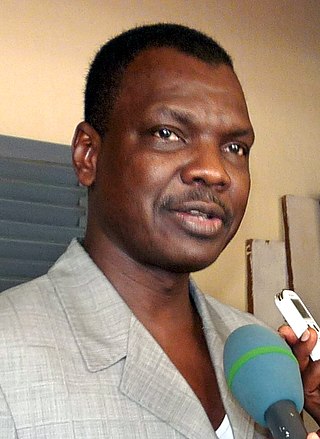
Mahamat Kamoun is a Central African politician who was the Prime Minister of the Central African Republic, in an interim capacity, from 10 August 2014 to 2 April 2016. He was the country's first Muslim Prime Minister.

Operation Sangaris was a military intervention of the French military in the Central African Republic, from late 2013 till 2016. It was the seventh French military intervention there since the independence of the country in 1960. On 30 October 2016, France announced it officially ended Operation Sangaris.

The Bangui National Forum was a national reconciliation conference organized by the transition government of the Central African Republic (CAR). It took place in Bangui from May 4 to 11, 2015 and was part of the third phase of the Brazzaville process. Following the Brazzaville ceasefire conference of July 2014 and the CAR popular consultations during the first quarter of 2015, the forum resulted in the adoption of a Republican Pact for Peace, National Reconciliation and Reconstruction in the CAR and the signature of a Disarmament, Demobilisation, Rehabilitation and Repatriation (DDRR) agreement among 9 of 10 armed groups.

Central African Republic–Democratic Republic of the Congo relations refers to the current and historic bilateral relationship between the Central African Republic (CAR) and the Democratic Republic of the Congo (DRC). The two countries are neighbours and share a border 1,747 km long. Due to the military conflicts on both sides of the border, many refugees have crossed into the other's territory. There were about 200,000 Congolese nationals in the Central African Republic as of 2014, and there were around 100,000 Central African refugees in the DRC as of 2016.

Popular Front for the Rebirth of Central African Republic is a rebel group in the Central African Republic which controls areas of the northern part of the country, until 2021 based in N'Délé.

General elections were held in the Central African Republic on 27 December 2020 to elect the President and National Assembly. A second round of the legislative elections was originally scheduled to take place on 14 February 2021.
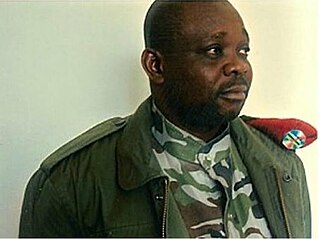
Abdoulaye Miskine is a Chadian-Central African warlord and a former FACA officer who served under Patasse Government. He was the leader of Democratic Front of the Central African People.
References
- Agence France-Presse (2012-11-14). "Centrafrique/rébellion: un gendarme et deux civils tués dans une attaque proche de Bangui (gendarmerie)". ReliefWeb. Bangui, CAR. Retrieved 2012-12-30.
- Agence France-Presse (2009-11-19). "Rebels claim Ndele in Central African Republic | ReliefWeb". Reliefweb.int. Retrieved 2012-11-24.
- RFI (2012-08-26). "Le CPJP, dernier groupe rebelle actif en Centrafrique, devient un parti politique". RFI. Retrieved 2012-12-30.